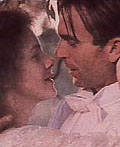
|
Year: 1979 "This story is going to be all about me. Here is the story about my brilliant career," writes Sybylla Melvyn, a headstrong young woman, at the beginning of My Brilliant Career. The film was adapted from an autobiographical novel by Australian writer Miles Franklin, and takes place in 1897 in the Australian Outback. In a voice over we hear Sybylla's thoughts when she says she has always known that she belongs to the world of art and literature and music. We feel her longing to broaden her intellect and to develop her fledgling artistic capacity. However, her dreams seem incongruous with her lot in life as the eldest of five or six siblings on a small impoverished farm. One of the characteristics needed by a writer is an ability to internalize and, when necessary, disregard the rest of the world. Sybylla does this superbly, especially when her family seems most in need of her physical assistance as they struggle against the elements -- literally holding down the fort -- during a drought induced dust storm. She wants no part of the daily chores -- cleaning the house, milking the cow, cooking the food, darning the socks -- and, while every other family member is attuned to their duty, she obliviously plays the piano. Just when it seems that Sybylla will be turned over as a "general servant" to a wealthy family, because her own parents can no longer afford to room and board her, she is rescued by a letter from her wealthy maternal grandmother inviting her to come and live with her. "Your family always had illusions of grandeur," Sybylla's father says rather accusingly to her mother. And once we see the refined environment in which she was brought up we realize that, long ago, her mother, too, must have had a few exalted dreams of her own. In her first staring role, a fresh Judy Davis, is the epitome of a headstrong young woman who spurns the social expectations of turn-of-the-century Australia. Her broad, freckled face and unruly Gibson Girl-styled orange hair are a perfect metaphor for unconventionality and irreverence. Sybylla is a giant sunflower, loudly exclaiming her presence. And Davis' elemental energy and charisma ensures a remarkable performance. Another characteristic necessary to the writer's life is a belief in one's own strengths and abilities. As if she had already been guaranteed of her future literary success, a skittish but confident Sybylla equally negotiates life's opportunities and reversals. Even when a nearly irresistible wealthy, aristocratic bachelor, Harry Beecham, enters her life and proposes marriage, this feisty could-be Cinderella cleaves ever more vigorously to her literary aspirations. She is determined to put passion on paper. "Give me a chance to find out what's wrong with the world. . . and me," Sybylla tells a disappointed but patient Harry. "Find out who I am. Then I'll marry you." Instead of marriage, as a result of her parents' financial plight, Sybylla finds herself in conscription as a governess to another family whose living conditions are far worse than those at her own home. Tutoring a randy batch of off-spring in an open-air dilapidated shack, pigs and chickens wandering freely, Sybylla is beginning to see what's wrong with the world -- and herself. After two years pass Harry once again pursues this intelligent, independent, outspoken young woman. But as before, Sybylla declares passionately, "I want to be a writer. And I've got to do it now. And I've got to do it alone." In the end, sometimes the most powerful ally a writer has is his or
her own commitment to be a writer. And, against all odds, to continually
make writing a life choice. The final scene of My Brilliant Career has
Sybylla writing through-out the night to complete her first novel. Alone,
she carries the wrapped manuscript -- her only copy -- to her postbox
and, as she lets the first rays of the early morning sun graze her euphoric
face, an endnote on the screen reads: "My Brilliant Career was
published in 1901 in Edinburgh, Scotland." |
 My
Brilliant Career
My
Brilliant Career